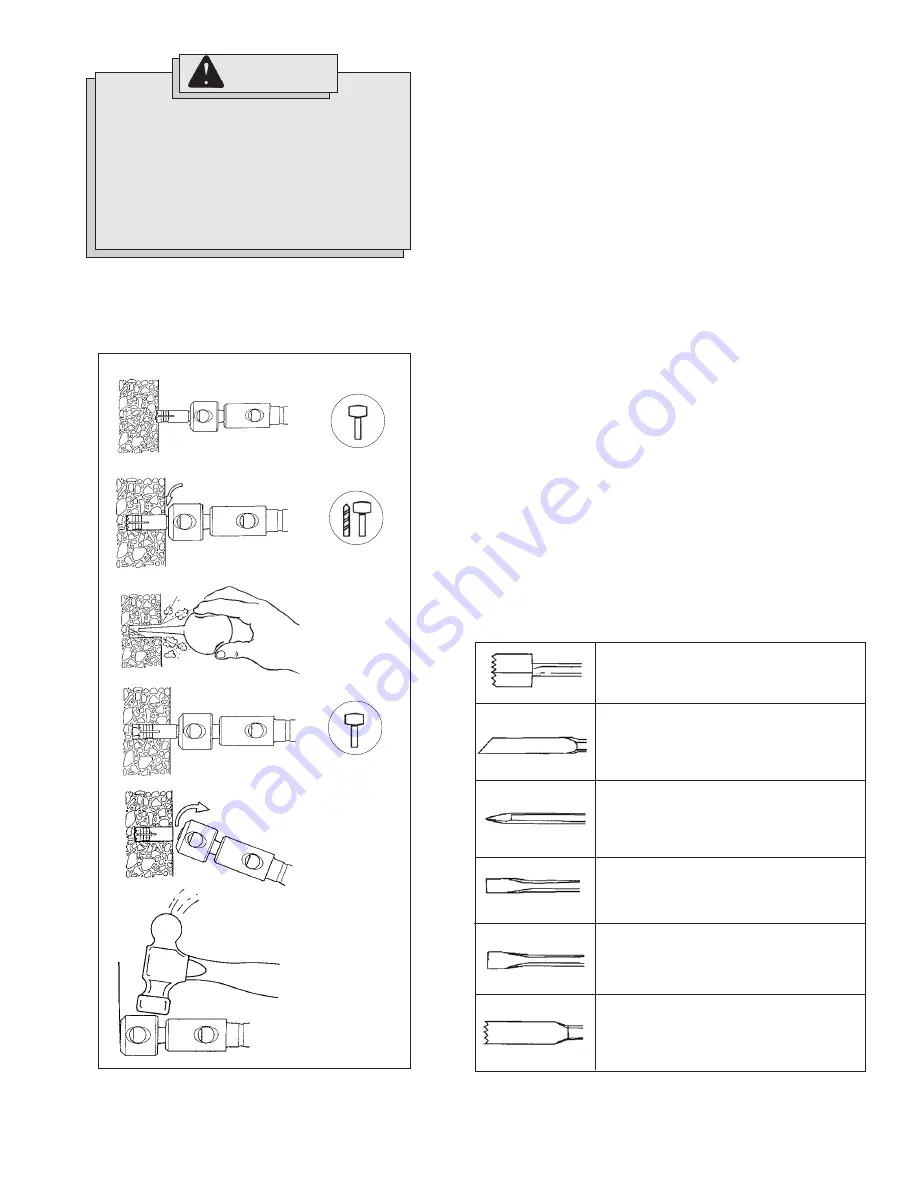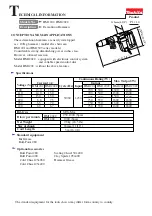
page 8
Setting Self-Drilling Anchors (Fig. 13-18)
(Cat. No. 5314-21 only)
The 5314-21 Rotary Hammer features a stop rotation knob which is
helpful for setting self-drilling anchors up to 5/8".
MILWAUKEE
Tooth
Anchor Chucks require a “B” taper adapter.
To reduce the risk of personal injury and
damage to the tool or work:
•
Always use the “hammering-only” setting
to set the anchor. Never use the “hammer-
ing-with-rotation” setting to set the anchor.
•
Never switch the tool to “hammering-with-
rotation” until after the anchor has been
set and the tooth anchor chuck has been
removed from the anchor.
1.
Place the proper size tooth anchor chuck into the “B” taper adapter.
Then insert the “B” taper adapter into the tool and lock it into place as
described. See “Installing Bits and Chisels”.
2.
Insert the anchor into the tooth anchor chuck. Set the stop rotation
knob for hammering only. Set the anchor on your mark and hammer
until the teeth have penetrated the concrete (Fig. 13).
3.
Set the stop rotation knob for hammering with rotation and drill until
the chuck is 1/8" above the concrete (Fig. 14).
NOTE:
It may be necessary to clean dust and cuttings from the an-
chor several times while drilling the hole.
4.
Remove the anchor from the hole while the tool is running. Clean the
dust and cuttings from the anchor by pointing it downward and turn-
ing the tool on and off several times. Clean the dust out of the hole
with a vacuum cleaner or blowout bulb (Fig. 15).
5.
Place the expansion plug into the anchor and insert the anchor into
the hole. Switch the stop rotation knob back to hammering only, and
hammer the anchor firmly into the hole (Fig. 16).
6.
Snap the head off of the anchor. To remove the head of anchors up
to 5/8", grasp the handles firmly and pull the tool sharply towards you
(Fig. 17) or snap off the anchor head with a hand hammer as shown
(Fig. 18). The anchor is now ready to receive a bolt.
7.
To remove the anchor head wedged in the tooth anchor chuck, use
drift pin 48-86-0100.
8.
To remove the tooth anchor chuck, remove the “B” taper adapter
from the nose of the tool. Insert the drift pin supplied with the adapter
into the hole on the side of the “B” taper adapter and strike it sharply
to force out the tooth anchor chuck.
Chiseling and Chipping
MILWAUKEE
1-1/2" Rotary Hammers may be used for chipping and chis-
eling.
When chiseling, hold the tool at an angle to the workpiece. Work from a
corner or close to the edge of the workpiece, breaking off one small area
at a time rather than attempting too large an area.
A variety of accessories are available.
Fig. 14
Fig. 16
Fig. 13
Fig. 15
1/8"
Scaling Chisels
For removing weld spatter or scale and cut-
ting straight lines.
Bushing Tools
Used to surface concrete.
Mortar Cutting Chisels (Seam Tools)
For removing old mortar for tuck pointing or
caulking.
Bull Points
For demolition work and starting holes in
concrete slabs.
Flat Chisels
For edging, chipping or channeling.
Slotting Chisel
For slotting and cutting between drilled holes
in concrete and masonry.
Fig. 18
Fig. 17
WARNING!


































